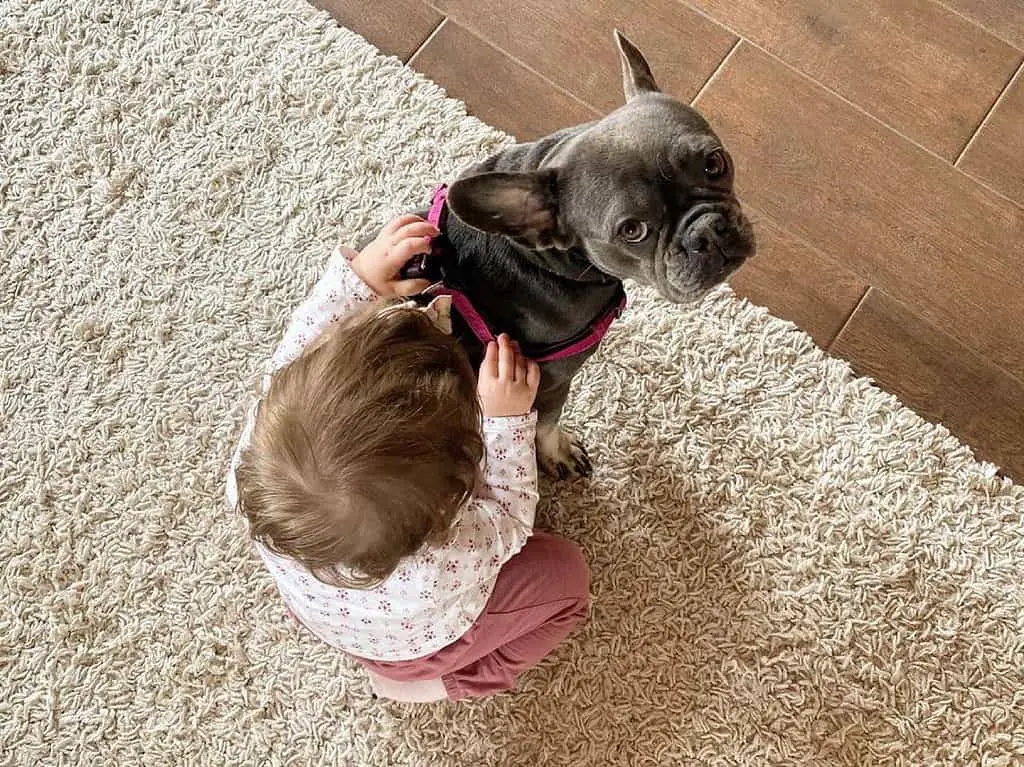If you’re looking to add another furry member to your family, the Frenchie might have caught your eye.
Characterized by their wrinkly faces and entertaining temperaments, these small dogs can make excellent companions. But if you have children at home, your first question is likely whether or not a French Bulldog would be a good fit as a family pet.
Are French Bulldogs good with kids? Let’s find out.

Understanding The Frenchie’s Temperament
One of the defining characteristics of French Bulldogs is their love for socialization, seen through their amicable demeanor towards people, particularly children. This renders them ideal family pets. Additionally, due to their tendency to readily develop intimate connections with their human guardians, it is not uncommon for a loyal and faithful companionship between French Bulldog and its owner to form.
Despite their smaller size, French Bulldogs have become renowned for exhibiting courageous and confident behavior. Though they are generally warm and relaxed, they can display a determined attitude when it comes to training. To direct these intelligent animals successfully, trainers need to be patient, give consistent instructions, and reward beneficial behavior with positive reinforcement.
Their pranks and energetic conduct contribute to an entertaining atmosphere, while their facial features – especially their ears resembling those of bats and communicative eyes – create an adorable disposition.
In addition, French Bulldogs are typically sociable and responsive to change. They often display a calm temperament indoors, making them suitable for condos and apartments. While these dogs may not require vigorous exercise, frequent walks, and activities must be maintained to stimulate them physically and mentally.
In summary, French Bulldogs possess valuable characteristics, including friendliness, affection, and humor. Their lovable disposition, bravery, and amusing behaviors make them perfect companions to families. Whether they are cuddling on the sofa or providing entertaining antics, French Bulldogs will captivate those who come across them.
Read also: 12 Things You Should Know About Frenchies (#4 Will Suprise You)
Are French Bulldogs Goods With Kids?
The answer is yes! French Bulldogs are highly regarded as pets due to their endearing personalities and compatibility with children. The breed is noted for its short legs, compact physique, and gentle disposition, which all promote safety in family settings. With this factor of consideration, a further investigation into the character traits that make French Bulldogs an appropriate companion around children can help inform prospective pet owners.
Small and Sturdy: French Bulldogs are small-sized dogs, typically weighing between 16-28 pounds. Their compact and sturdy build makes them less prone to accidentally knocking over or causing injury to small children than larger dog breeds. Because of their manageable size, they allow children comfortable interaction and play.
Gentle and Patient: The even-tempered nature of French Bulldogs is essential when dealing with the occasional unanticipated conduct of children. They may yank ears or tails, attempt to climb, straddle, or engage in vigorous play without comprehending the consequences. A composed French Bulldog will react smoothly to these actions and lower the risk of hostile or defensive outbursts that might harm the child.
As they have relatively low levels of aggression and strongly favor companionship and love, these dogs are less likely to demonstrate behaviors that would endanger or alarm the child. This attribute is essential in curtailing unfortunate scenarios where the dog may become unsettled or aggressive, leading to a bite or injury.
Most importantly, by fostering an environment of understanding and tenderness with French Bulldogs, children may cultivate a sense of empathy and responsibility. They can discover how to show respect for animals and comprehend appropriate conduct and boundaries through interaction with a dog that consistently reveals patience and gentleness. These lessons are transferable not only across animals but also to human interactions.
Affectionate and Loving: French Bulldogs are incredibly affectionate around children. The importance of this trait cannot be overstated.
The nurturing interaction between a child and their pet has been associated with elevated oxytocin levels or the ‘love hormone.’ It has been documented that this hormonal response reduces stress, anxiety, and blood pressure levels; providing children with improved physical and mental health. Additionally, a loving Frenchie can encourage children to be physically active through outdoor activities, promoting healthy habits while decreasing the risk of childhood obesity.
Playful: French Bulldogs demonstrate initiative when engaging in playtime with children, displaying qualities beneficial to developing a positive bond. Through interactive activities, French Bulldogs provide entertainment and encourage mental and physical exercise that heightens the relationship between dog and child.
Routine playtime facilitates the maintenance of ideal body weight and physical condition, consequently diminishing potential medical concerns. Additionally, playful actions often inspire others to do the same, inducing a positive environment in the home.
Adaptable: French Bulldogs are known to be capable of adapting their lifestyle and behaviors depending on the environment they are placed in. Requiring only moderate outdoor activity, these dogs are not excessive in their exercise needs, simplifying integrating one into a family’s routine.
These dogs are a good match for owners leading different lifestyles. They demonstrate an ability to adjust and be satisfied with whatever level of physical activity is available – whether it be contentedly running in the park or happily spending time inside.
Not A Big Barker: Children tend to be more sensitive than adults to loud noises and sudden disruptions, which can cause anxiety or emotional distress. French Bulldogs are known for being relatively quiet, thus encouraging a tranquil environment that creates feelings of safety and calmness for kids. This, in turn, bolsters confidence and allows kids to build trust in their Frenchie.
Furthermore, the lack of barking typically exhibited by French Bulldogs around children can ensure their safety. Excessive noise can startle or disturb small ones and potentially cause them to harm themselves with falls or other injuries. Because French Bulldogs remain generally composed, they help foster a safer environment for play and engagement.
The non-barky nature of French Bulldogs also plays a role in fostering responsible pet ownership and maintaining peace in residential communities. The disturbance that excessive barking or screaming can impose on neighbors, specifically in tight-knit neighborhoods, can become very problematic. Not to mention, its ability to strain relations between one another is also prominent. Ultimately, this instills a positive example of owning pets responsibly in others.
Good with Other Pets: Owners with other small animals in the home must choose a French Bulldog with a friendly and tolerant disposition. These dogs can swiftly create positive relationships among themselves and existing pets while forming a strong bond among all household members. This sense of unity ensures all animals’ coexistence within one home and encourages camaraderie.
Additionally, the sociability of a French Bulldog does not only manifest within the household. This trait becomes especially crucial when venturing outside for walks or playtime at parks since interactions with other animals become likely and unavoidable. A well-socialized French Bulldog which is friendly and open towards other animals will not create tension or aggression while outside, making the experience more pleasant for both pup and owner alike.
This compatibility extends to situations where families or friends come together, bringing their pets. A family reunion, a visit to an acquaintance’s residence, and even holidays are made more comfortable for all parties involved because Frenchie’s are good-natured.
Read also: Are French Bulldogs Hypoallergenic Dogs Or Bad For Allergy Sufferers?
The Cons Of Having Frenchies

One significant concern is their vulnerability to health issues. French Bulldogs are particularly prone to health issues due to their brachycephalic skull structure. The compressed airway of these animals hinders their ability to regulate body temperature. It can result in respiratory problems and overheating, posing a substantial risk for exhaustion and heatstroke if they partake in overly energetic play with kids.
Another consideration is the breed’s relatively small size and delicate build. Kids may unintentionally mishandle or play too roughly with French Bulldogs, leading to injuries.
Frenchies can also be strong-willed. This can prove to be difficult when training, particularly for those who lack expertise in dog ownership or individuals with inexperience caring for animals, such as small children. Not controlling and setting boundaries can lead to unruly behavior or even the possibility of an injured child.
Separation Anxiety
French Bulldogs can experience extreme anxiety and distress when separated from their primary caregiver or owner. This condition is known as separation anxiety, and it often arises because dogs form strong relationships with their human companions; therefore, being left alone for too long can induce severe negative feelings.
Separation anxiety in dogs may range from mild to intense. It can manifest through aggressive barking, screaming, howling, crying, destruction of objects in the home, pacing around a room restlessly, and increased urination or defecation inside the house. These manifestations often appear immediately after the owner departs and can last for multiple hours.
Fortunately, there are various approaches to provide relief from separation anxiety. Firstly, establishing a consistent schedule for feeding times, physical activity, and playtime is essential in giving the pet a feeling of safety and consistency, which could help reduce anxieties.
Desensitization and counterconditioning are additional approaches that might come in handy. This method involves slowly introducing the dog to events or activities that commonly elicit anxiety, for example, grabbing a set of keys or putting on a jacket, without actually departing. Doing these steps several times can gradually teach the pet that the cues aren’t always followed by its owner leaving, alleviating agitation.
Providing interactive toys, puzzle feeders, or long-lasting treats before leaving can help keep the dog occupied and entertained while they are alone. Transitioning a pet’s perception of their owner departing into an enjoyable one has been proven to reduce stress.
Providing a safe and secure space for the dog may be beneficial. This could be a crate, a designated room, or an area equipped with soft bedding and familiar items. Dogs are known to take refuge in dens as part of their instinct, so having such an environment can provide peace of mind when left alone.
The dog can be desensitized to leave and return by implementing a routine of gradual departures and arrivals. To prevent reinforcing anxious behavior, it is recommended to ignore any overly excited displays when arriving home, instead waiting for them to become calm before greeting them.
It may be necessary to seek assistance from a professional in some instances. Consulting with a veterinarian or dog behaviorist can supply helpful guidance and help tailored to the canine’s needs. Furthermore, they could suggest additional methods, including medication or specialized training, for managing more severe cases of separation anxiety.
Small Dog Syndrome
Like any other small dog breed, Frenchies can exhibit behaviors found in small breeds, otherwise known as “small dog syndrome” or “small dog complex.”
Owners of French Bulldogs may notice specific behaviors, such as constant barking, extreme protectiveness over toys and food, aggression towards people or other animals, and unresponsiveness to commands.
This syndrome is heavily affected by genetic makeup, environmental circumstances, and how the Frenchie has been socialized and trained. Note that the breed does not in itself determine its behavioral traits; individual upbringing and life experiences somewhat shape this.
Establishing clear boundaries and rules for dogs afflicted with small dog syndrome is necessary, in addition to exercising patience and a calm approach. Do not overindulge your French Bulldog, which may reinforce its dominant demeanor.
To cultivate pro-social behaviors, use a reward-based training program that offers treats and praise as reinforcement for good behavior and responsiveness. Socialization must be undertaken earnestly to minimize fear and uneasiness; this involves introducing the dog to a diverse range of people, animals, and new environments.
Ensuring your pet receives regular physical and mental exercise can be beneficial in multiple ways, primarily regarding preventing small dog syndrome. All family members must also adhere to similar training methods and rules for successful results.
By implementing these strategies and providing a loving, structured environment, small dog syndrome can be effectively managed, allowing your dog to reach their full potential and contribute positively as a family member.
Importance Of Socializing French Bulldogs With Kids
Introducing French Bulldogs to children at a young age can produce an enduring bond and familiarity, offering companionship for years to come.
Secondly, socialization is essential for developing appropriate behavior and manners in French Bulldogs. They gain valuable lessons from interactions with children, such as being gentle and respecting personal space. The same applies to children who can learn how to be considerate and compassionate towards animals. This dynamic allows French Bulldogs and kids to live together in harmony.
Socialize French Bulldogs with children early on to reduce potential problematic behavioral issues. If a Frenchie has not been exposed to children, they can become fearful or reactive when encountering them. Gradually introducing the dog and child will help the pooch grow accustomed to their presence and noises – decreasing the likelihood of negative reactions. Socialization also helps foster a more tolerant attitude towards unpredictable situations.
In addition, French Bulldogs are pretty socially dependent, so regular exposure provides the proper stimulation needed to prevent boredom or potential behavioral issues from a lack of companionship. Such socialization also creates lasting memories that reinforce the bond between them and their human family.
Safety Tips For Parents And Children When Around A French Bulldog

Parents should educate their children on how to interact with a French Bulldog. A French Bulldog may become distressed if mishandled, so it should always be done gently and calmly. Although French Bulldogs are sociable and friendly, they still have boundaries that must be respected when interacting with them.
Meanwhile, parents should be attentive during dog and child interactions. Monitoring the interactions closely will ensure the child’s and the animal’s safety. This cautionary approach should be employed particularly when introducing an unfamiliar French Bulldog to a young child for the first time.
As previously mentioned, French Bulldogs have a shortened skull and compressed face, which is classified as brachycephalic. This characteristic can make them more susceptible to specific health issues, such as breathing difficulties and heat sensitivity. As the owner of these dogs, keep in mind their physical limitations and provide them with a suitable environment, especially during hot weather or vigorous play sessions.
Avoid exposing your French Bulldog to excessive heat exposure, strenuous exercise, and prolonged outdoor activities in hot weather. Also, teach kids to recognize signs of distress in dogs, such as heavy panting or excessive drooling, so they may inform an adult if these symptoms occur.
Another essential safety measure is to educate kids on respecting a French Bulldog’s need for personal space. This includes not disturbing the Frenchie when it is eating, taking a nap, or doing an activity that requires its complete focus. Dogs, like people, benefit greatly when their boundaries are acknowledged. Consequently, an overly protective response could arise if these limits are not considered.
References
Olff, M., Frijling, J. L., Kubzansky, L. D., Bradley, B., Ellenbogen, M. A., Cardoso, C., … & Van Zuiden, M. (2013). The role of oxytocin in social bonding, stress regulation and mental health: an update on the moderating effects of context and interindividual differences. Psychoneuroendocrinology, 38(9), 1883-1894.
Han, J. C., Lawlor, D. A., & Kimm, S. Y. (2010). Childhood obesity. The lancet, 375(9727), 1737-1748.
Deckelbaum, R. J., & Williams, C. L. (2001). Childhood obesity: the health issue. Obesity research, 9(S11), 239S-243S.
Rooney, N. J., Clark, C. C., & Casey, R. A. (2016). Minimizing fear and anxiety in working dogs: A review. Journal of Veterinary Behavior, 16, 53-64.




